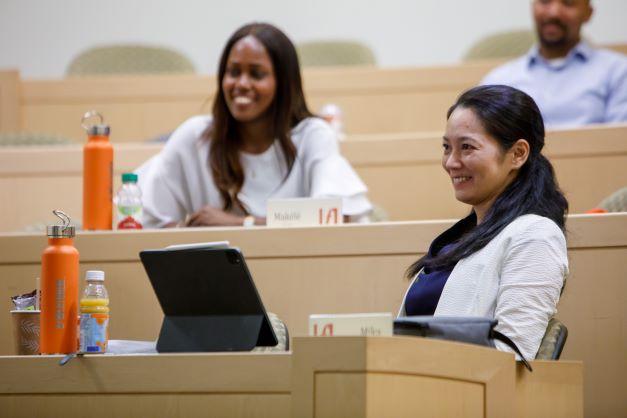-

Hear from Monica Toft, Academic Dean
Learn how Monica Toft, Academic Dean, is shaping the study of global affairs and diplomacy at Fletcher.
Hear from Prof. Toft -

Explore Fletcher academics in action
Fletcher Features offers insights, innovation, stories and expertise by scholars.
Get global insights -
Get application tips right from the source
Learn tips, tricks, and behind-the-scenes insights on applying to Fletcher from our admissions counselors.
Hear from Admissions -

Research that the world is talking about
Stay up to date on the latest research, innovation, and thought leadership from our newsroom.
Stay informed -
Meet Fletcherites and their stories
Get to know our vibrant community through news stories highlighting faculty, students, and alumni.
Meet Fletcherites -

Forge your future after Fletcher
Watch to see how Fletcher prepares global thinkers for success across industries.
See the impact -

Global insights and expertise, on demand.
Need a global affairs expert for a timely and insightful take? Fletcher faculty are available for media inquiries.
Get in Touch
A Pioneering Global Affairs Master’s Program
GMAP showcases renewed emphasis on leadership skills development

The Fletcher School’s Global Master of Arts Program (GMAP) broke new ground when it was introduced more than 20 years ago as one of the only hybrid, year-long master’s degree programs designed specifically for mid-career professionals looking to remain in the workforce while pursuing an elite global affairs degree.
Now, in response to today’s global realities and advances in educational technologies, particularly hybrid-learning tools, the program is about to undergo a few refinements, according to Hilary Price, Assistant Dean for Professional Education. “In making these enhancements, we have been careful to retain the key features of the program, including its academic pillars which have made it such a valuable program to our students.”
The GMAP curriculum is grounded in three core subject areas—diplomacy and history, politics and the law, and business. At the heart of the curriculum are courses such as "Global Economy,” “International Security,” and “International Politics and Diplomacy.”
It’s a curriculum designed to guide students through an exploration of the complex and nuanced intersections of international business, international organizations, non-governmental organizations (NGOs), and governments. “At Fletcher, we believe in a 360-degree view of a topic,” says Price. “It’s a multi-disciplinary approach to education and a hallmark of The Fletcher School.”
To build on that approach, Fletcher professors reimagined class content and structure, and in doing so, tightened the links between different subjects that will enable students to better understand the relationships. In addition, faculty are enhancing opportunities for students to examine subjects through the lenses of the world’s most challenging problems–security, sustainability, gender, poverty, and religious differences,
There will be a deeper emphasis leadership as the main through-line in the curriculum by introducing a year-long Global Leadership Seminar, to include leadership pods.
There will also be the introduction of skill-building opportunities both inside and outside of traditional coursework. There will be two new specialized sessions called Skill Summits conducted online over the course of two weekends on the topics of “Data Analytics for Leaders” and “Persuasive Communication.” Both will provide intensive, hands-on learning experiences through workshops and interactive simulations.
To align the GMAP program with Fletcher’s on-campus programs, its academic year will now run June to May (instead of August to July), a move that creates opportunities for GMAP students to participate more fully in the life of the school and develop connections with alumni and students outside the program. Also, for the first time, GMAP students will graduate alongside on-campus program graduates in the school’s and university’s graduation ceremony.
Structurally, the academic year will consist of the following elements: five, six-week online modules consisting of two courses each; a one-week, in-person, on-campus residency in the fall that will focus on leadership and negotiations; a one-week, in-person residency held in an international location in the spring that will focus on policy design and implementation; and two weekend Skill Summits.
The early modules will focus on economic analysis, legal and governance analysis, sustainability and other topics related to the global economy. Later modules will delve into policy design and implementation, cyber policy, and international security. All courses will incorporate the latest educational tools and technologies, with an emphasis on creative application.
Students will use the school’s learning management system (Canvas) to access various curriculum materials and to collaborate via livestream Zoom sessions and other online communication tools. Course instruction and assignments will be delivered primarily via Canvas for students to complete asynchronously using video and other digital media, so live sessions and in-person residencies can focus on interactive discussions, simulations, and other experiential learning activities.
Peer groups, or Teams, a longstanding component of the GMAP program, will continue to be vital to the student experience. These are small groups who meet regularly to discuss coursework, complete group assignments and support each other through what is inevitably an intense and challenging academic experience.
Price says one of the greatest strengths of the GMAP program is that it attracts applicants from all over the world who have such different backgrounds and can be on completely different career trajectories. “Sharing those experiences with peers is invaluable, and the peer groups promote the building of those relationships,” she remarked. “After our students graduate from the program, they take the relationships with them. It’s really quite extraordinary.”
Fletcher has been an innovator in the field of international relations for 90 years. The continuing enhancements to its pioneering GMAP program are testament to its unparalleled record of leadership.

